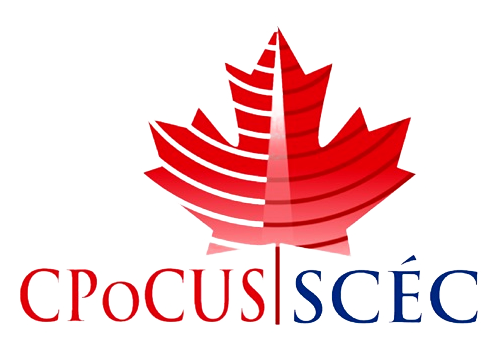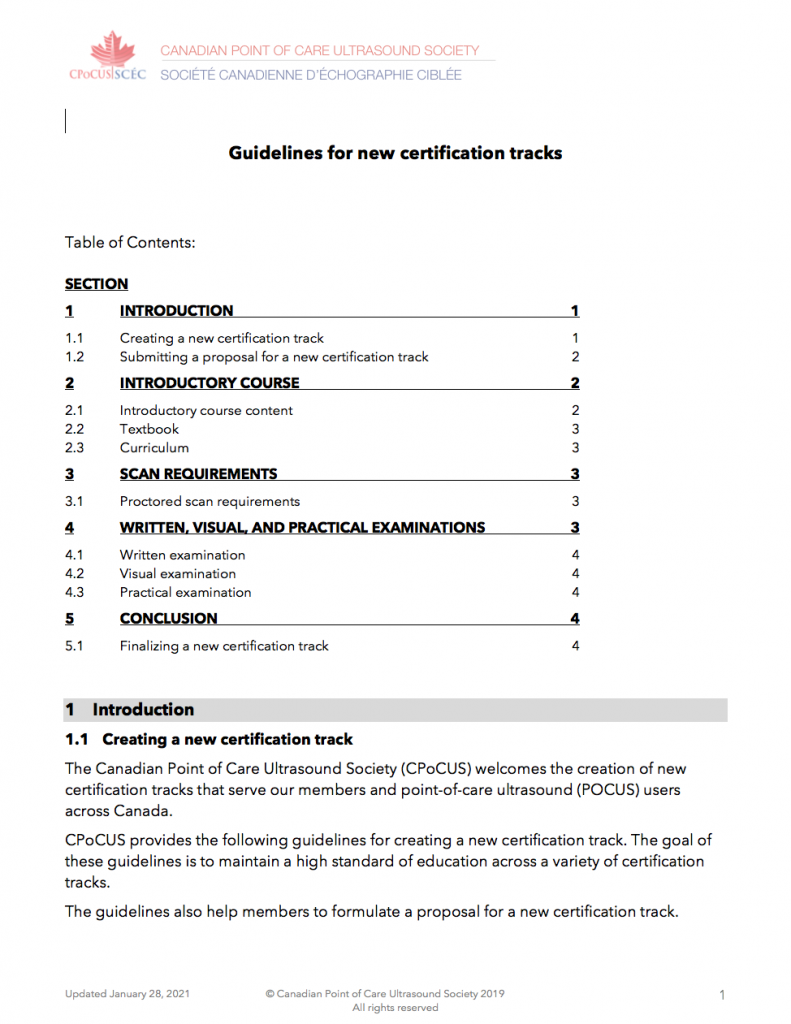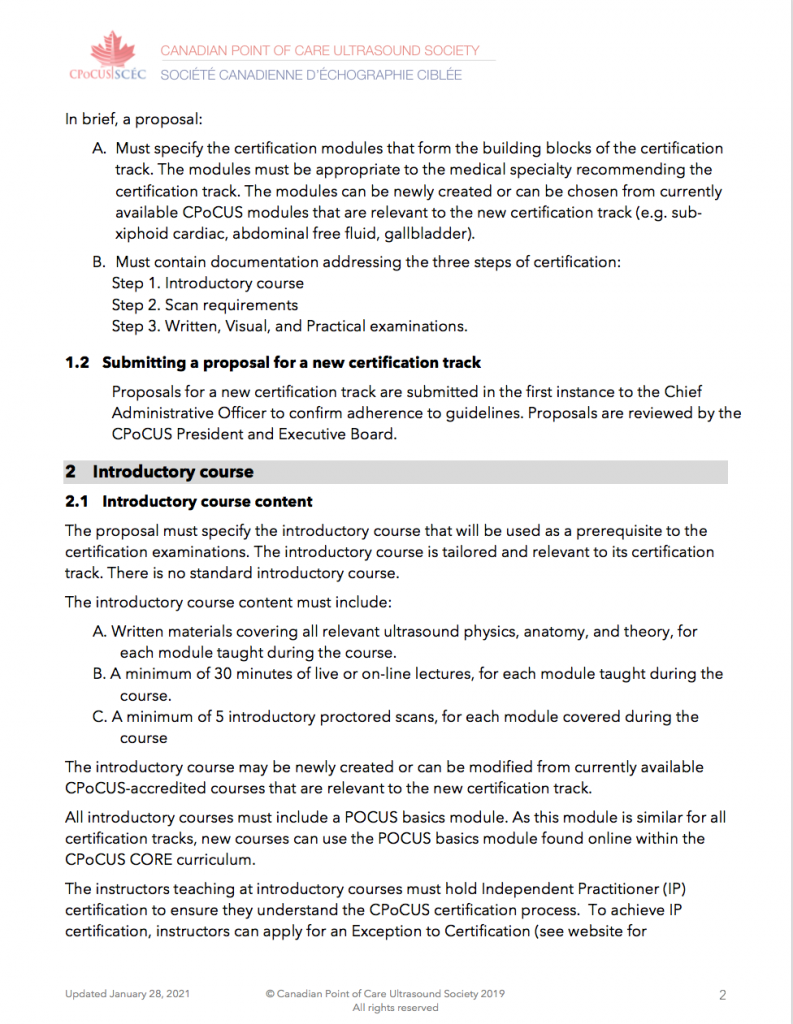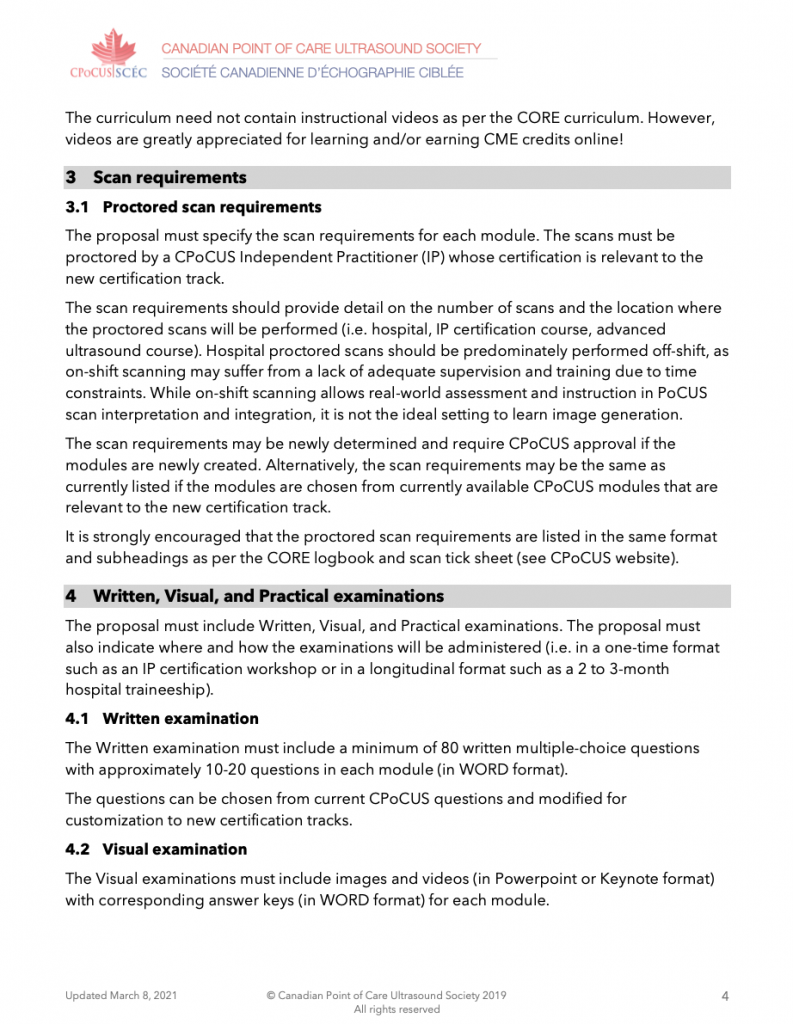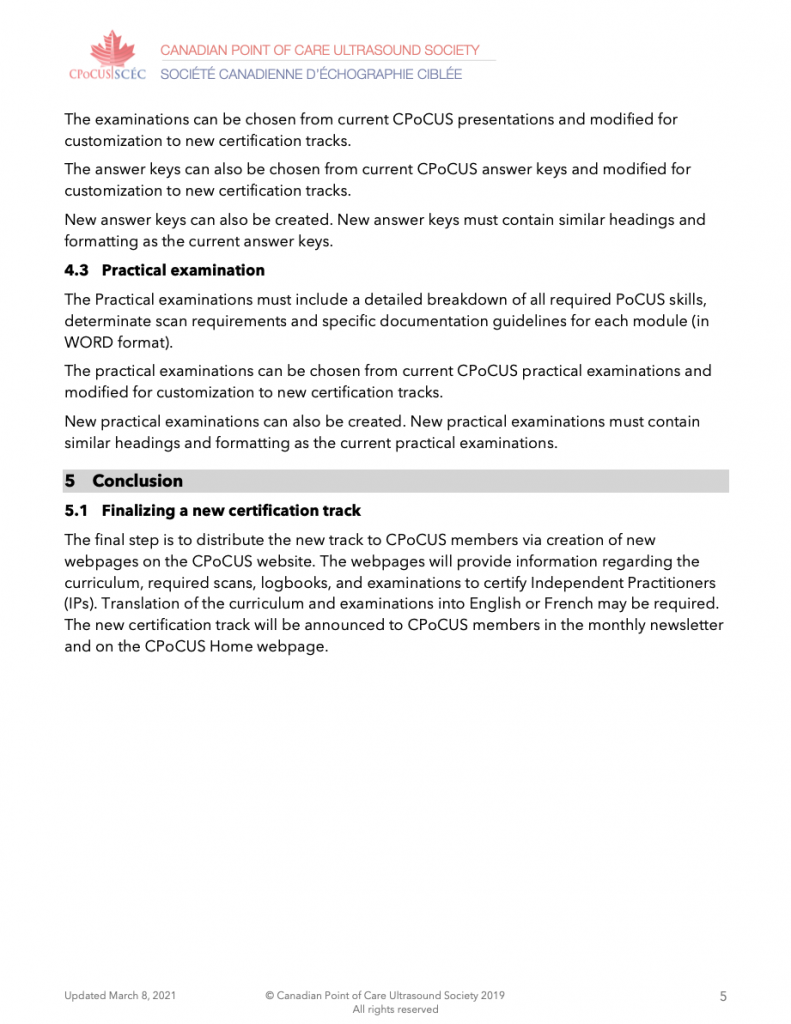Getting your IP certificate
Réception du certificat PI
An increasing number of hospitals and clinics now request a CPoCUS IP certificate to practice POCUS.
To get your IP certificate after fulfilling the requirements, please pay the one-time IP certificate fee.
Payment provides:
an upgrade from Noncertified Member to Certified Member for one or five years,
an IP certificate and IP number,
free future IP certificates,
access to instructional/clinical videos,
ability to earn CME credits, certify others, and be remunerated as a Track or Master Instructor.
For payment details, see email from admin@cpocus.ca after fulfilling certification criteria.
Your IP certificate will be issued after you pay the IP certificate fee.
It may take up to 10 mins for your certificate to appear in My Account.
=======
Un nombre croissant d'hôpitaux et de cliniques demandent désormais un certificat PI de la SCÉC pour pratiquer l'échographie ciblée.
Pour obtenir votre certificat PI après avoir rempli les conditions requises, veuillez payer les frais uniques de certificat PI.
Le paiement permet d'obtenir:
une amélioration du statut de membre non certifié à celui de membre certifié pour un ou cinq ans
un certificate PI et un numéro de PI,
des certificats PI gratuits à l'avenir,
accès à des vidéos pédagogiques/cliniques,
la possibilité d'obtenir des crédits de FMC, de certifier d'autres membres et d'être rémunéré en tant que Formateur.trice de volet ou Maître-formateur.trice.
Pour les détails de paiement, voir le courriel de admin@cpocus.ca après avoir rempli les critères de certification.
Votre certification PI sera finalisée après que vous ayez payé les frais de certificat PI.
Ça peut prendre 10 mins après le paiement pour que votre certificat apparaisse dans My Account.
Guidelines
Guidelines for
Maintenance of Competency (MOC)
These CPoCUS guidelines are for Certified members
The guidelines outline the expectations for IP certification to remain valid
Guidelines for
Ultrasound Training for Family Medicine Residents
These guidelines describe the POCUS training expectations
of the College of Family Physicians of Canada (CFPC)
The CFPC Residency Training Profile for Family Medicine includes POCUS as a Core Professional Activity for the Family Medicine Certificates of Added Competence in Emergency Medicine, Palliative Care, and Obstetrical Surgical skills
Guidelines for
New tracks
These CPoCUS guidelines are for members who want to create new tracks
The guidelines maintain consistent standards of training across diverse tracks
Member Benefit: Members can propose new tracks
Guidelines for
Simulators
These CPoCUS guidelines are for course directors
The guidelines explain the use of ultrasound simulators during certification scanning
Guidelines - Safe courses
These guidelines are for situations where ultrasound courses are not permitted by provincial healthcare recommendations.
If ultrasound courses are not permitted by provincial recommendations, members can complete the Written exam remotely without the presence of an examiner. Members can also complete the Visual exam remotely while video-conferencing with an examiner. The Practical exam can be completed in person if all participants are wearing personal protective equipment.
Member Communications

Surveys
Archive of surveys
#01 The use of POCUS in hospitals during COVID-19 pandemic (University of Saskatchewan)
#02 Guidelines for safe ultrasound courses
#03 Plans and policies
#04 Evaluation of MOC program
#05 Survey on using POCUS scans performed on an ultrasound simulator for IP certification training
Please log in to view letters to Members and Course Directors below
Frequently Asked Questions
Dues support producing and updating over 100 examination documents, generating Independent Practitioner (IP) certificates, managing the membership database, performing translations, answering emails (over 1000 per year), updating FAQs, updating the website with changes in policy, accounting, producing newsletters, and building and maintaining a website without advertisement.
If you are taking a CPoCUS approved course, you can earn:
a) Up to 30 certified Mainpro+ credits from CFPC
b) 3 credits per hour of activity; max 24 hours or 72 credits per course from RCPSC
If you are teaching a CPoCUS approved course, you can earn:
a) 1 non-certified credit per hour of teaching and/or preparation time from CFPC
b) 2 credits per hour of teaching from RCPSC
If you are administering a CPoCUS certification exam, you can earn:
a) 1 non-certified credit per hour of teaching from CFPC
b) 2 credits per hour of teaching from RCPSC
If you are supervising determinate scans, you can earn:
a) 1 non-certified credit per hour of teaching and/or preparation time from CFPC
b) 2 credits per hour of teaching from RCPSC
Please see our CME Credits webpage for more details.
Membership is open to all persons interested in POCUS. Please see Question #11 if you are an experienced POCUS user.
A sample of published articles for family medicine residents using POCUS:
a. Micks et al (2018) Canadian national survey of point-of-care ultrasound training in family medicine residency programs. Can Fam Phys 64(10):e462-e467.
b. Peng et al (2019) Canadian national survey of family medicine residents on point-of-care ultrasound training. Can Fam Phys 65(12):e523-e530.
c. Steinmetz, P., Oleskevich, S. (2016) Family medicine ultrasound (FAMUS): indications, accuracy, and cost-effectiveness. J Fam Pract 65(8):517-523.
d. Book: https://www.amazon.com/Ultrasound-Primary-Care-Paul-Bornemann/dp/1496366980
e. Bornemann et al., Assessment of Primary Care Physicians’ Use of a Pocket Ultrasound Device to Measure Left Ventricular Mass in Patients with Hypertension, J Am Board Fam Med. 2015 Nov-Dec.
f. Bornemann et al., Point-of-care ultrasound: Coming soon to primary care? J Fam Pract. 2018.
g. Assessment of a Novel Point‐of‐Care Ultrasound Curriculum’s Effect on Competency Measures in Family Medicine Graduate Medical Education. Paul Bornemann MD 2017 https://doi.org/10.7863/ultra.16.05002
h. Audio file: https://www.pocus.org/resources/the-focus-on-pocus-podcast-episode-6/
i. American Academy of Family Physicians: https://www.aafp.org/dam/AAFP/documents/medical_education_residency/program_directors/Reprint290D_POCUS.pdf
Please go to My Account and follow the instructions.
It is essential that you log in with the email account associated with your CPoCUS account. Contact us if you are unsure which email address is associated with your account. Please use Chrome, Firefox, or Safari on a desktop computer for best website function.
The CORE exams have been completely re-designed and improved! The Written and Visual exams are now conducted online. The Practical exams have been vastly improved. They are now an objective assessment of the image generation skills every IP should possess. To find out more, click here.
First, you must become a Noncertified member to access curricula, instructional videos, and IP Written exams. Noncertified membership:
$25 for one year
$100 for five years
Second, after fulfilling the certification criteria, you must upgrade your account to Certified Membership to view your IP certificates, certify others, and become Track / Master Instructors:
$125 for one year
$500 for five years
The above are costs for becoming an IP in your first track.
To become an IP in subsequent tracks, you need to ensure your Certified membership is active to access the IP Written exams.
You must be logged in to pay your membership dues. For best results, we recommend using a desktop computer. Do not use an iPad or tablet. To renew your membership, go to My Account> My Memberships> Renew.
The Exception to Certification application form was created to recognize senior clinicians who have acquired significant POCUS experience outside of the CPoCUS IP certification program.
Members with the following criteria can request an Exception to Certification:
Have significant experience in POCUS scanning (average 7 years)
Have completed 80% of the required number of supervised scans in each track module
Have completed a significant number of POCUS courses
Have significant experience teaching POCUS at courses and/or to individuals
If granted an Exception to Certification, members do not need to complete an introductory course or acquire logged scans and can proceed directly to attempt the three certification examinations.
All members must complete the three certification examinations regardless of experience.
Access the Exception to Certification application form relevant to your track here.
Yes. Anyone can become IP certified if they fulfill the requirements of certification.
You can download the CORE logbook cover and pages by logging in and navigating to the Members section>relevant track>Logbooks
A list of CPoCUS-approved courses can be found here.
A list of CPoCUS-approved certification scanning workshops can be found in the track webpages in the ‘Train’ section.
CPoCUS is creating a centralized database of IP certified instructors. Please contact the Society and we will do our best to assist you.
Log into your account. Click on My Account in top right corner. Go to Past Invoices.
EDTU scans do not count towards CPoCUS certification requirements because:
a) EDTU instructors are often not CPoCUS IP certified and thus cannot certify others
b) EDTU courses do not follow the CPoCUS curriculum; thus criteria for a determinate scan may be different than CPoCUS criteria.
For order of payments, see Question #9.
The IP certification process is dependent on the IP candidate using the same email address for paying membership dues, or attempting the Written Exam. The examiner must also use this same email address when submitting an IP Request. The use of multiple email addresses will disrupt the certification process.
Logged (determinate) scans required for IP certification must be supervised in person.
Supervised scans that are required for certification are valid for 5 years prior to passing the certification examinations. The date of the supervised scans is indicated in the logbooks.
Results from the Written examination are valid for 5 years prior to completion of the remaining Visual and Practical examinations for Independent Practitioner (IP) certification.
The use of POCUS, like most other medical skills, is governed by the scope of practice defined by the appropriate college for a particular physician’s practice. In some provinces, billing for POCUS is also restricted based on specialty and practice setting. Most hospitals have privileging for POCUS that defines the minimum requirements for a physician to use the skill.
CPOCUS provides a national and high-level set of training standards that can be used by successful candidates in their application to use POCUS in whatever setting they work. Some provincial billing schedules refer to CPoCUS or an equivalent program as an example of the minimum required level of training. Some hospital privileging committees and department chiefs also refer to CPoCUS or formal residency training as the minimum requirements for using POCUS in their institution.
In the case of working independently in a clinic, it is recommended to check with your specialty’s provincial or national organization and affiliated college to see what their current recommended requirements may be for this environment.
The timeline for receiving your IP certificate depends on three factors:
1) The date your examiner submits a request for your IP certificate.
2) The CPoCUS timeline for issuing certificates which is on the 1st and 15th of each month.
3) The date CPoCUS receives your IP certificate fee payment to upgrade your account from Noncertified to Certified Membership.
You will receive an email from our admin office with instructions on how to access your IP certificate. Please wait for this email prior to contacting our admin office.
Payment of the IP certificate fee is required to upgrade your account from Noncertified to Certified Membership. Your account must be upgraded to Certified Membership status to obtain your IP certificate.
Why do I need to obtain my IP certificate?
- Many hospitals and clinics now request a CPoCUS IP certificate to practice POCUS.
- IP certificates can be used to apply for CME credits.
- The CFPC may request copies of IP certificates for auditing or credit validation purposes, for up to six years.
If you were certified after Dec 31st, 2017, and have paid your annual membership dues and certificate/upgrade fee, you will be able to find your certificate in My Account.
If you were certified before Dec 31st, 2017, please contact us once you have completed a CORE Lung Competency Declaration here so that we can issue an updated CORE IP certificate. If you have paid your annual membership dues and certificate fee, we will issue a certificate accessible via My Account.
Your IP number is indicated in My Account and on your IP certificate. If you have misplaced your IP certificate, please see FAQ#1 above.
If you were CORE IP certified before December 31, 2017, then you are not certified in the lung modules, Pleural effusion and Pneumothorax, as the lung modules were added after this date. You can add lung modules to your existing certification by completing the CORE Lung Competency Declaration.
Choose one of the two options depending on whether you are proficient in lung ultrasound or would benefit from additional practice in lung ultrasound.
The CORE Lung Competency Declaration form can be found here.
You must be logged in to pay your membership dues. For best results, we recommend using a desktop computer. Do not use an iPad or tablet. To renew your membership, go to My Account> My Memberships> Renew.
- Prior to Dec 31, 2017, CPoCUS CORE IP members had the option to certify someone in the CORE indications without the lung components.
- After Dec 31, 2017, CPoCUS CORE IP members must complete the lung components of the CORE certification examinations (pleural effusion and pneumothorax) to certify others. Those members certified prior to Dec 31, 2017 can complete the CORE Lung Competency Declaration to be able to certify others after Dec 31, 2017.
Members can apply for Master Instructor status by submitting an application form. Note that candidates must have acquired significant experience in performing and teaching PoCUS, and have made a significant contribution in the education and application of PoCUS. Please visit the CPoCUS webpage for further information.
Please see FAQ#6 on how to apply for Master Instructor (MI) status. You can recommend another member for MI status by submitting an online reference form or sending a recommendation letter to the member which they attach to their application for MI.
Please visit our webpage on how to administer the CPoCUS IP certification exams here.
Log into your account. Click on My Account in top right corner. Go to Past Invoices.
As of July 2022, payment of annual membership dues is required one year from last payment date. A reminder email will be sent to individual members seven days before the expiration date and on the expiration date. Lack of payment results in membership cancellation and lack of access to CPoCUS Members section.
Payment of annual membership dues provides access to important CPoCUS webpages and to 25+ member benefits!
Membership dues support administration of over 100 certification examinations available in two languages and on two platforms, six curricula and 32 instructional videos, earning CME credits, Maintenance of Competency Program, eLearning Program, annual awards, annual reports, monthly newsletters, and replying to members’ queries (over 1000 per year). Thank you for your support!
Only examiners can view the passwords required to access Written Exams. Examiners with the relevant certification can view the passwords in the Members section>relevant track>Exams> Written Exam.
If you are taking a CPoCUS approved course, you can earn:
a) Up to 30 certified Mainpro+ credits from CFPC
b) 3 credits per hour of activity; max 24 hours or 72 credits per course from RCPSC
If you are teaching a CPoCUS approved course, you can earn:
a) 1 non-certified credit per hour of teaching and/or preparation time from CFPC
b) 2 credits per hour of teaching from RCPSC
If you are administering a CPoCUS certification exam, you can earn:
a) 1 non-certified credit per hour of teaching from CFPC
b) 2 credits per hour of teaching from RCPSC
If you are supervising determinate scans, you can earn:
a) 1 non-certified credit per hour of teaching and/or preparation time from CFPC
b) 2 credits per hour of teaching from RCPSC
Please see the CME Credits webpage for more details.
The IP certificate can be used to apply for CME credits. It contains instructions on CME credits. Additional information is available on the website under the menu tab ‘Earn CME Credits’.
According to CFPC, course directors cannot obtain a Session ID for past CORE IP courses. They can only apply for a course-specific Session ID before the course has started.
Note: the course-specific Session ID will appear on the CFPC website once the course has been completed.
a) How can I achieve this?
For Members who have AC CORE IP with Lung certification:
- Do not need to complete an FM CORE introductory course.
- Do not need to complete the FM CORE determinate scans.
- Do not need to complete the FM CORE Practical or Visual exam.
- Must complete the FM CORE Written exam in the presence of an examiner who is another CPoCUS member with FM CORE IP or AC CORE IP certification
For Members who have AC CORE IP without Lung certification:
- Do not need to complete an FM CORE introductory course.
- Must complete 10 bilateral FM CORE determinate lung scans (20 scans total).
- Must complete the lung section of the FM CORE Practical and Visual exam.
- Must complete the FM CORE Written exam in the presence of an examiner who is another CPoCUS member with FM CORE IP or AC CORE IP certification
b) What does this certification allow me to do, other than what I can already do with the AC CORE IP certification?
The Family Medicine CORE IP certification allows you to scan independently in the outpatient / office setting.
Family Medicine (FM) CORE IP certification track is best suited for primary care clinicians who do not have or do not need Acute Care (AC) CORE IP certification and who use ultrasound in the outpatient / office setting.
FM CORE IP certification is similar to AC CORE IP certification except for the Written Exam component of the certification exams.
The FM CORE Written Exam contains questions to test your knowledge on the use of ultrasound in patient management in the outpatient / office setting.
c) What are the costs for the FM CORE Written Exam?
Once all exams are successfully passed, there is a one-time administrative fee of $100 to issue an IP certificate, as for all CPoCUS IP certificates.
d) Where can the Written Exam be taken?
The Written Exam can be attempted online in any location in the presence of an examiner who is a FM CORE IP or AC CORE IP Member (paid dues).
e) How long does the FM CORE IP certification last?
The FM CORE IP certification no longer expires, as for all CPoCUS IP certifications. This came into effect on April 19, 2021, following feedback from our members.
f) How often do I have to renew the certification?
You no longer need to renew the IP certificate as of April 19, 2021.
This issue arises when a Member has two different CPoCUS accounts with two different email addresses.
The IP certificate and email explaining how to receive the certificate may be sent to a Member’s second/inactive CPoCUS account.
It is essential that Members do not create two CPoCUS accounts with different email addresses.
It is also essential that Examiners use the Member’s active CPoCUS account and email address when submitting the IP request!
Previously, the Visual exam presentations could be viewed on a tablet without internet using a commercial app (iSpring). This now presents difficulties as the iSpring app does not support all years and all types of devices, all browsers, and all operating systems.
Instead, course directors of CPoCUS-accredited courses can access an offline version of the Visual Exam presentation in emergency situations where no internet is available (see email to course directors Feb 2023 for instructions).
A detailed table outlines the certification privileges available to CPoCUS IP certified members. Log in to view the table here.
Logged (determinate) scans required for IP certification must be supervised in person.
The use of POCUS, like most other medical skills, is governed by the scope of practice defined by the appropriate college for a particular physician’s practice. What CPOCUS provides is a national high-level set of training standards that can be used by a successful candidate in their application to use POCUS in whichever setting/province they work.
In most hospital settings, the privileging committees define what the minimum requirements are for a physician to use POCUS. In some hospitals, the committees and department chiefs indicate that either CPoCUS certification or formal residency training is the minimum requirement for using POCUS.
In clinic settings, it is recommended to check with your specialty’s provincial or national organization and affiliated college to see what their current recommended requirements are for using POCUS in this environment.
In some provinces, the billing schedules for POCUS refer to CPoCUS certification or an equivalent program as an example of the minimum required level of training.
The Canadian Point of Care Ultrasound Society (CPoCUS) focuses on educational training and certification. In order to be designated as an Independent practitioner for the identification of DVT using POCUS, a CPoCUS member must have:
- Completed a CPoCUS accredited course in the CPoCUS Diagnostic (DIAG) track which teaches the appropriate technique for the identification of DVT with point of care ultrasound AND
- Successfully completed the requisite number of DVT scans supervised by either a track instructor or a master instructor in the DIAG track AND
- Successfully challenged the written, practical, and visual exams covering the DVT module in the CPoCUS DIAG track.
Being certified as a CPoCUS IP in the DIAG track covering DVT means that the CPoCUS member has completed the above steps. CPoCUS feels that any member who has completed these steps should have the adequate technique to identify a DVT using POCUS.
Your question also pertains to the care path that should be followed after a DVT is either identified, or not identified for a given patient.
CPoCUS emphasizes that POCUS is one data point within an entire clinical assessment. One of our guiding principles is that clinical judgment always takes precedence over POCUS.
For DVT, the interpretation of POCUS scans depends on the patient’s pretest probability for having a DVT, and locally accepted care paths.
Below is a non-exhaustive list of examples of how this care path may vary depending on clinical circumstances.
For patients in whom a DVT is not identified using POCUS:
- For the patient presenting with a clinical scenario that suggests a low pretest probability of DVT and has no complications (no chronic DVT, no recent previous DVT, not pregnant, not morbidly obese etc), it may be acceptable to use POCUS as a rule out test if DVT is not
- For the patient presenting with a clinical scenario that suggests a moderate to high pretest probability of DVT, even if DVT is not found on POCUS, additional testing or close follow up would be necessary before declaring that there is no DVT.
- For the patient with complications (chronic DVT, recent previous DVT, pregnancy, morbid obesity…), an ultrasound should be ordered from the radiology department to guide management.
For patients in whom a DVT is identified using POCUS:
Local consultants may require an additional elective ultrasound by radiology, but in the absence of contraindication for anticoagulation it could be acceptable to start empiric anticoagulation until that scan is done. In other centres, the POCUS positive scan may be all that is initially required. Therefore your management is in part dictated by your specific practice setting.
It should be emphasized that the two region, proximal leg DVT scan in the CPoCUS DIAG track curriculum has patient limitations. Its performance characteristics are similar to radiologist ultrasound but only in the uncomplicated patient. i.e. no chronic DVT or recent previous DVT, not pregnant, not morbidly obese, etc. For these complex patients, the user should be very conservative about interpreting a scan and have a low threshold for confirmatory testing and/or reassessment.
According to the Ontario Health Insurance Plan (OHIP) Schedule of Benefits, the certification needed to use the billing code H100 is ‘CPoCUS Independent Practitioner’. You must be certified in the scans you are able to bill for (June 29, 2023; see pg. A14 for full details):
H100 Emergency department investigative ultrasound……………….. $19.65 / day / patient
[Current standards and minimum requirements for training and experience for Emergency Department investigative ultrasound may be found at the Canadian Emergency Ultrasound Society website].
Please note that OHIP has been advised that CEUS has been replaced by CPoCUS.
CMQ will reimburse Quebec physicians for certain continuing medical education activities including course costs.
The course must be accredited by CMQ to be eligible for reimbursement.
Please contact your course director for proof of course accreditation by CMQ.
Note that CPoCUS does not give courses, courses are organized by independent organizations, and CPoCUS has no direct interaction with CMQ.
